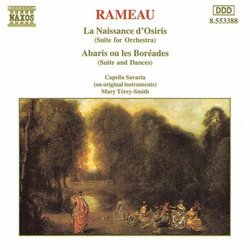Lively, spirited introduction to the French Baroque
Nancy Moran | Baltimore, Maryland USA | 11/30/2002
(5 out of 5 stars)
"Rameau at his best. Flutes, tambourines and strings in wonderful arrangement. Oboes in the slow movements played with infinite precision. Tubas and horns adding contrast. Embellishment with the greatest of delicacy. Rhythm is created by stress on the strings and overlay of the other instruments. A tribute to the 18th century and the royal court of Louis XV. Here, the ensemble Capella Savaria, led by Mary Terey-Smith, a Hungarian who became an accomplished academician in the United States and Canada, uses original instruments to create the authentic sound of the royal court in Baroque France. This is supposed to be "opera", but it is far from the "operas" two centuries hence and, controversally, the Italian operas of the day. The libretto is not disclosed nor is it significant. Polyphony is restrained but very much evident in multi-instrument dialogues and duets. The interplay of the flutes with the strings and other instruments is very satisfying. It all culminates in a rousing finale in 6/8 time."
Rameau: Orchestral Suites (vol. 1)
Bjorn Viberg | European Union | 07/15/2006
(5 out of 5 stars)
"Rameau: Orchestral Suites (vol. 1)~ Jean-Philippe Rameau is simply put it a wonderful and stupendous recording from one of the masters of French Baroque music. The Baroque time period was an amazing time for music in my opinion and produced such great composers such as Bach, Vivaldi, Purcell to mention a few. Whilst not being as accomplished as Bach, Rameau is right on par with composers such as Vivaldi and Purcell. The book-let is well done with a wonderful painting on the front and the essay on Rameau is well written and not over-long or verbose. I highly recommend this splendid recording to fans of Baroque music and to people that fancy good music in general and give this 5 out of 5 stars."
Some of the best Rameau, but...
R. G. W. Brown | Tustin, CA, USA | 07/11/2007
(3 out of 5 stars)
"I prefer Bruggen's interpretations and recordings whenever possible.
The Naxos recordings here are a little on the dull side, from a sound-quality and energy/vitality perspective. Bruggen's are richer and more dance-like - they are simply more musical performances."


 Track Listings (22) - Disc #1
Track Listings (22) - Disc #1